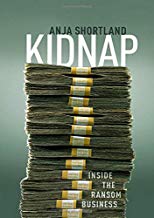
For most of us, our experience with kidnapping comes solely at the cinema. But kidnapping is big business in some parts of the world. This is what political economist Anja Shortland discovered, and is the subject of both her book and this episode.
In fact, Shortland learned that not only are most kidnappings resolved without violence, in some cultures, kidnappings are often a normal part of “being heard.” Kidnapping might even be thought of as a sort of entrepreneurship.
1- What does Shortland mean by “the shadow of the future,” and how does the concept serve as explanation for why kidnappuing transactions go so smoothly?
2- What’s the role of the insurance industry, and Lloyd’s in particular, in this market? How are reputational effects managed? How is local knowledge discovered, and what is such knowledge used for?
3- Why don’t kidnappers resort to violence against their victims, or ratchet up violence as their demands are unmet, according to Shortland?
4- How does the transfer of money and body ever go right, unlike in the movies? What role do middlemen play in the kidnapping business? Who are these middlemen?
5- What did Shortland learn about doing economics from her work on kidnapping? What’s something you learned about economics from listening to this episode?


Comments are closed.